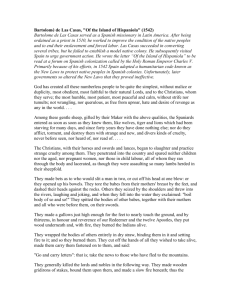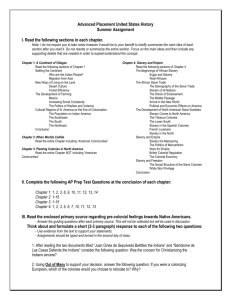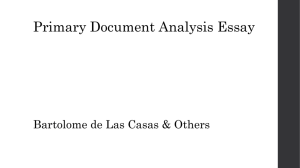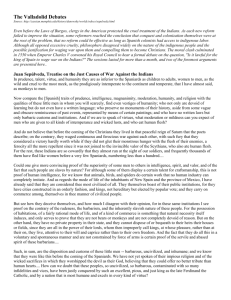Valladolid Debate Primary Sources (9/1-2)
advertisement
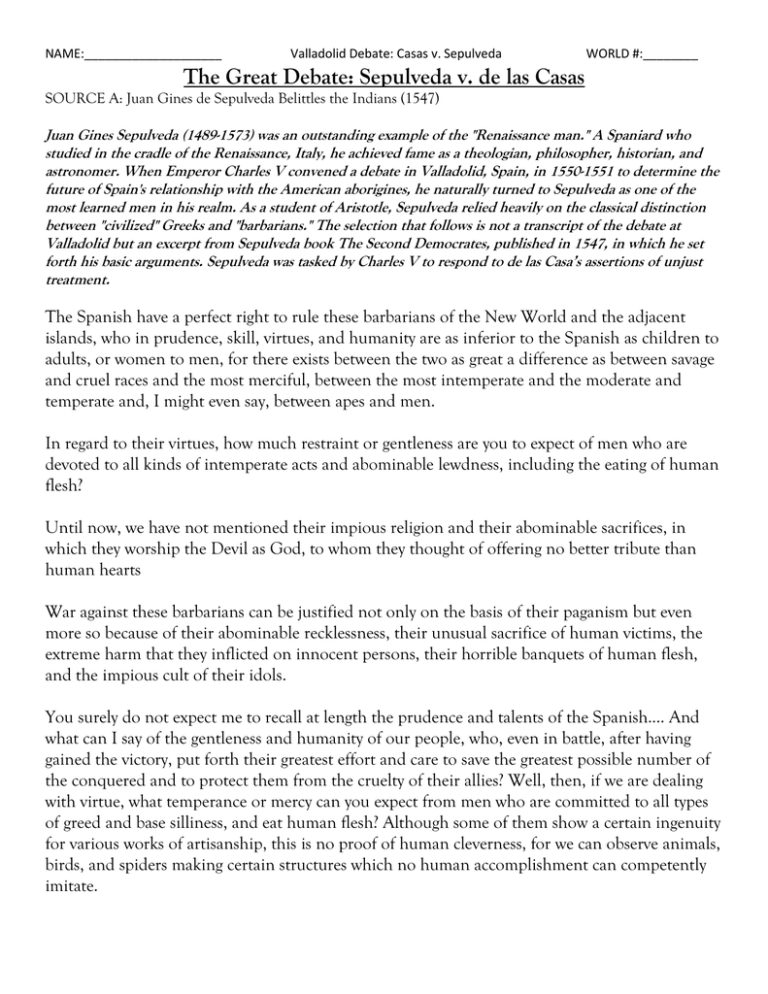
NAME:____________________ Valladolid Debate: Casas v. Sepulveda WORLD #:________ The Great Debate: Sepulveda v. de las Casas SOURCE A: Juan Gines de Sepulveda Belittles the Indians (1547) Juan Gines Sepulveda (1489-1573) was an outstanding example of the "Renaissance man." A Spaniard who studied in the cradle of the Renaissance, Italy, he achieved fame as a theologian, philosopher, historian, and astronomer. When Emperor Charles V convened a debate in Valladolid, Spain, in 1550-1551 to determine the future of Spain's relationship with the American aborigines, he naturally turned to Sepulveda as one of the most learned men in his realm. As a student of Aristotle, Sepulveda relied heavily on the classical distinction between "civilized" Greeks and "barbarians." The selection that follows is not a transcript of the debate at Valladolid but an excerpt from Sepulveda book The Second Democrates, published in 1547, in which he set forth his basic arguments. Sepulveda was tasked by Charles V to respond to de las Casa’s assertions of unjust treatment. The Spanish have a perfect right to rule these barbarians of the New World and the adjacent islands, who in prudence, skill, virtues, and humanity are as inferior to the Spanish as children to adults, or women to men, for there exists between the two as great a difference as between savage and cruel races and the most merciful, between the most intemperate and the moderate and temperate and, I might even say, between apes and men. In regard to their virtues, how much restraint or gentleness are you to expect of men who are devoted to all kinds of intemperate acts and abominable lewdness, including the eating of human flesh? Until now, we have not mentioned their impious religion and their abominable sacrifices, in which they worship the Devil as God, to whom they thought of offering no better tribute than human hearts War against these barbarians can be justified not only on the basis of their paganism but even more so because of their abominable recklessness, their unusual sacrifice of human victims, the extreme harm that they inflicted on innocent persons, their horrible banquets of human flesh, and the impious cult of their idols. You surely do not expect me to recall at length the prudence and talents of the Spanish.... And what can I say of the gentleness and humanity of our people, who, even in battle, after having gained the victory, put forth their greatest effort and care to save the greatest possible number of the conquered and to protect them from the cruelty of their allies? Well, then, if we are dealing with virtue, what temperance or mercy can you expect from men who are committed to all types of greed and base silliness, and eat human flesh? Although some of them show a certain ingenuity for various works of artisanship, this is no proof of human cleverness, for we can observe animals, birds, and spiders making certain structures which no human accomplishment can competently imitate. NAME:____________________ Valladolid Debate: Casas v. Sepulveda WORLD #:________ 1. How does Sepulveda describe the native population? What examples does he use to support his claim? 2. What justifies war to subdue that native population? 3. How does the author compare the natives to the Spanish? NAME:____________________ Valladolid Debate: Casas v. Sepulveda WORLD #:________ SOURCE B: Bartolome de Las Casas Defends the Indians (1542) The Dominican friar Bartolome de Las Casas (1484-1566)was Sepulveda's great antagonist in the debates of 1550-1551 at Valladolid. A humane, sensitive priest, he was soon repelled by his countrymen's treatment of the native peoples of the New World. He eventually became Bishop of Guatemala and devoted himself to reforming Spanish colonial policies-for which he was recognized as the "Protector of the Indians." His vivid and polemical account The Destruction of the Indies did much to spread the "Black Legend" of Spain's brutal behavior in the New World a legend not without substance, and eagerly exploited by the rival English. De las Casas protested the treatment of Indians by the Spanish in his address to Prince Philip, the future king of Spain. Now if we shall have shown that among our Indians of the western and southern shores (granting that we call them barbarians and that they are barbarians) there are important kingdoms, large numbers of people who live settled lives in a society, great cities, kings, judges and laws, persons who engage in commerce, buying, selling, lending, and the other contracts of the law of nations. Reverend Doctor Sepulveda has spoken wrongly and viciously against peoples like these, has falsely and perhaps irreparably insulted them before the entire world? From the fact that the Indians are barbarians it does not necessarily follow that they are incapable of government and have to be ruled by other's, except to be taught about the Catholic faith and to be admitted to the holy sacraments. They are not ignorant, inhuman, or bestial. Rather, long before they had heard the word Spaniard they had properly organized states, wisely ordered by excellent laws, religion, and custom. They cultivated friendship and, bound together in common fellowship, lived in populous cities in which they wisely administered the affairs of both peace and war justly and equitably, truly governed by laws that at very many points surpass ours, and could have won the admiration of the sages of Athens.... Next, I call the Spaniards who plunder that unhappy people torturers.... For God's sake and man's faith in him, is this the way to impose the yoke of Christ on Christian men? Is this the way to remove wild barbarism from the minds of barbarians? Is it not, rather, to act like thieves, cut-throats, and cruel plunderers and to drive the gentlest of people headlong into despair? The Indian race is not that barbaric, nor are they dull witted or stupid, but they are easy to teach and very talented in learning all the liberal arts, and very ready to accept, honor, and observe the Christian religion. They have been endowed with excellent conduct, and before the coming of the Spaniards, as we have said, they had political states that were well founded on beneficial laws. The Indians are our brothers, and Christ has given his life for them. Why, then, do we persecute them with such inhuman savagery when they do not deserve such treatment? All the races of the world are men, and of all men and of each individual there is but one definition, and this is that they are rational. All have understanding and will and free choice, as all are made in the image and likeness of God … Thus the entire human race is one Finally, let all savagery and apparatus of war, which are better suited to Moslems than Christians, be done away with. Let upright heralds be sent to proclaim Jesus Christ in their way of life and to convey the attitudes of Peter and Paul. [The Indians] will embrace the teaching of the gospel, as I well know, for they are not stupid or barbarous but have a native sincerity and are simple, moderate, and meek, and, finally, such that I do not know whether there is any people readier to receive the gospel. Once they have embraced it, it is marvelous with what piety, eagerness, faith, and charity they obey Christ's precepts and venerate the sacraments. For they are docile and clever, and in their diligence and gifts of nature, they excel most peoples of the known world. . . . NAME:____________________ Valladolid Debate: Casas v. Sepulveda WORLD #:________ 1. How does de las Casas describe the native societies as advanced and complex societies? 2. Explain how de las Casas describes the process of helping advance the native population. Why are they capable? 3. Why does de las Casas criticize the Spanish? How should the Spanish treat the natives? Why? 4. Explain why you think this debate was needed.
